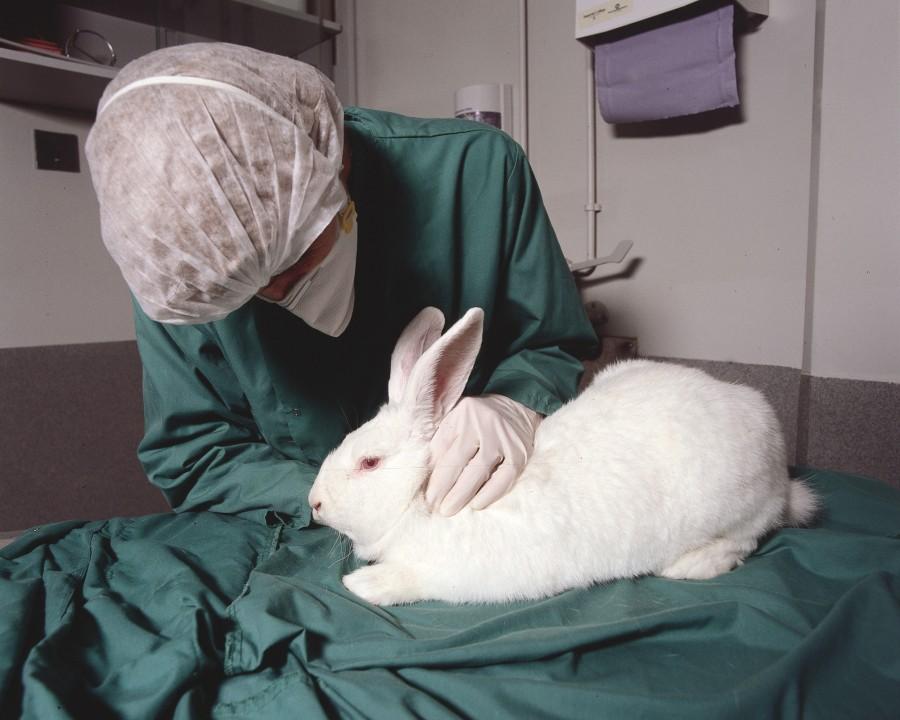Animal Testing by Student-Used Companies
Regulation of animal research in New Zealand
Rabbits are commonly used for eye irritancy tests.
Vivisection is defined as “the practice of performing experiments on live animals for the purpose of scientific research.” Numerous companies used by students test their products on animals, such as MAC, Pantene, Maybelline, Aveeno, Febreze, Covergirl, Tide, and Clorox. Ninety-four percent of animal-testing is used for cosmetics and household appliances, while the remaining six percent is used for medical research.
“There are all sorts of animal testing,” junior and president of Animal Rights Activists Ise Oberlender said. “Biomedical animal testing to an extent is all right. They take every measure to not involve animals in research. However, cosmetic research is both inhumane and irrelevant, and I think just a completely immoral use of our time in the laboratory.”
Many of the common types of tests done on animals are done with no anaesthetics, so nothing is used to reduce the amount of pain the animal experiences. A scientist is not required to provide anaesthetics if they believe it will disrupt their research.
“[The animals] can’t consent to it,” sophomore Sean Duane said. “Humans think it’s risky to test on humans, but they can consent. You’re just raising an animal to be killed.”
Lethal dose tests are done to determine the median lethal dose of a toxin, pathogen, or radiation that is able to kill half the members of a specific tested population. During these tests, the animals are first administered a specific dose. If all the subjects die from this, the dose is continually decreased until it causes only about half the members to die.
“When you’re talking about LD-50 doses and things of that nature, establishing those parameters are absolutely necessary if those medications are going to be used for human beings,” veterinarian Dr. Dave Ferrari said. “I understand that it is necessary under some circumstances, and my only hope is that it is done in as humane and controlled way as possible.”
The Draize eye irritancy test is a test usually performed on albino rabbits without anaesthetics. Its purpose is to determine whether products, usually cosmetics, are safe to use on human eyes. The albino rabbits are restrained in devices that prevent them from moving their head, and are observed for up to fourteen days for signs of redness, cloudiness, ulceration, swelling, discharge, hemorrhaging, or blindness in the tested eye. The rabbits are killed after completion of the test.
“Animals are obviously different than us; their skin is different,” Oberlender said. “The animals used, especially in cosmetic testing, are especially sensitive. Rabbits have the most sensitive skin, and it’s so horrifying to these rabbits when they’re so sensitive. We are preying on and abusing the animals with no defense mechanisms.”
Many countries, including the European Union, India, Israel, and Norway have made it illegal for companies inside their country to test on animals or to sell products from foreign animal-testing companies. Other countries, such as Canada, Taiwan, and Brazil, have also proposed legislations to ban animal-testing.
“I think [companies that perform testing on animals] should be forced to explore alternatives,” Dr. Ferrari said. “The unfortunate truth is that nothing ever gets done in a timely fashion. There are so many soapboxes out there that people are standing on saying, ‘you gotta correct this, you gotta correct that,’ and not everything can get corrected at the same time. I understand that sometimes animals have to be sacrificed to obtain useful knowledge, but it doesn’t mean that their dignity and well being has to be sacrificed along the way.”
In the United States, the Human Cosmetics Act was passed on June 26, 2015. This bill will prohibit cosmetic testing on animals when it becomes effective in June 2016. Three years after its date of enactment, this bill will prohibit any cosmetic from being sold or transported if the final product or any component was developed or manufactured using any form of animal-testing.
“[Animal testing] is a complete waste of life,” Oberlender said. “A lot of times [the animals] die and are thrown out. Human products should be tested on human people. If you’re afraid they won’t work, then why are you using the chemicals?”

Senior Izza Choudhry is a four-year staff reporter and former one-year copy editor and one-year news editor, now serving as opinion editor for the Spotlight....


